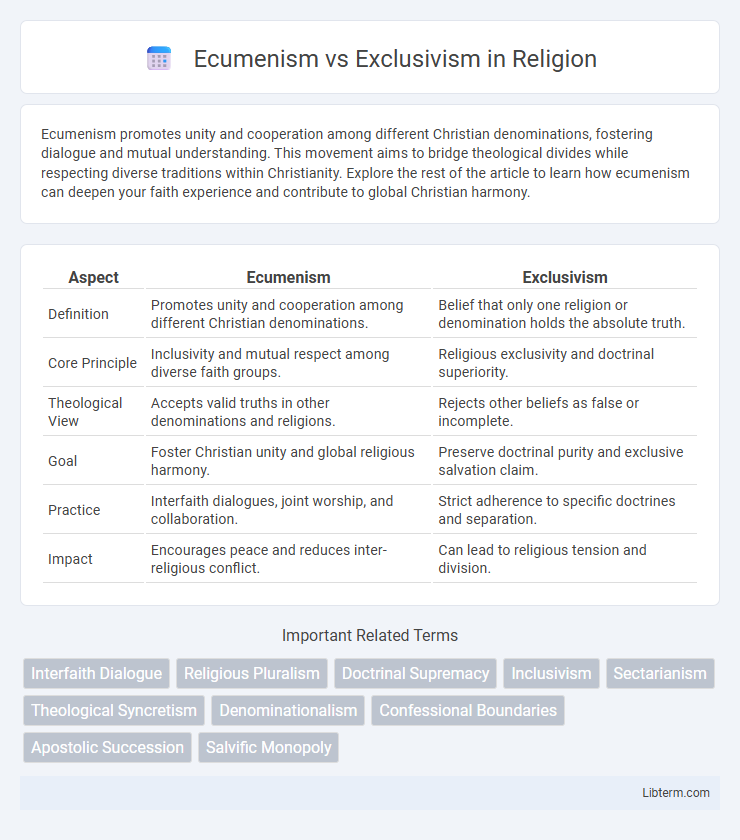Ecumenism promotes unity and cooperation among different Christian denominations, fostering dialogue and mutual understanding. This movement aims to bridge theological divides while respecting diverse traditions within Christianity. Explore the rest of the article to learn how ecumenism can deepen your faith experience and contribute to global Christian harmony.
Table of Comparison
| Aspect | Ecumenism | Exclusivism |
|---|---|---|
| Definition | Promotes unity and cooperation among different Christian denominations. | Belief that only one religion or denomination holds the absolute truth. |
| Core Principle | Inclusivity and mutual respect among diverse faith groups. | Religious exclusivity and doctrinal superiority. |
| Theological View | Accepts valid truths in other denominations and religions. | Rejects other beliefs as false or incomplete. |
| Goal | Foster Christian unity and global religious harmony. | Preserve doctrinal purity and exclusive salvation claim. |
| Practice | Interfaith dialogues, joint worship, and collaboration. | Strict adherence to specific doctrines and separation. |
| Impact | Encourages peace and reduces inter-religious conflict. | Can lead to religious tension and division. |
Introduction to Ecumenism and Exclusivism
Ecumenism promotes unity and cooperation among diverse Christian denominations, emphasizing shared beliefs and mutual respect to foster religious harmony. Exclusivism asserts that only one particular faith or belief system holds ultimate truth, often rejecting the validity of other religious perspectives. The debate between ecumenism and exclusivism shapes theological discourse, interfaith dialogue, and approaches to religious pluralism worldwide.
Historical Roots of Ecumenism
Ecumenism traces its roots to early Christian efforts to promote unity among diverse denominations, notably gaining momentum after the 20th century's World Missionary Conferences and the 1910 Edinburgh Conference, which emphasized cooperative evangelism and dialogue. The rise of the World Council of Churches in 1948 institutionalized ecumenical collaboration, fostering theological discussions to bridge doctrinal divides. These historical milestones contrast with exclusivism's approach, which maintains strict doctrinal boundaries and rejects interdenominational engagement.
Origins and Development of Exclusivism
Exclusivism originated primarily in the early centuries of Christianity, rooted in the belief that salvation is attainable only through explicit faith in Jesus Christ, as emphasized in foundational texts like John 14:6. Its development was influenced by doctrinal formulations during the Patristic period and was reinforced by the Reformation's focus on scriptural authority and ecclesiastical purity. Throughout history, Exclusivism has maintained a clear boundary between Christian truth claims and other religious beliefs, shaping theological debates on salvation and interfaith relations.
Core Beliefs: Ecumenist Perspectives
Ecumenist perspectives emphasize unity among diverse Christian denominations by focusing on shared core beliefs such as the divinity of Jesus Christ, the authority of the Bible, and the significance of sacraments like baptism and communion. This approach advocates for mutual respect and theological dialogue to bridge doctrinal differences while maintaining the integrity of essential Christian teachings. Ecumenism prioritizes inclusivity and collaboration, aiming to promote harmony and collective witness in global Christianity.
Central Tenets: Exclusivist Views
Exclusivist views in theology hold that salvation is attainable solely through explicit faith in a particular religious tradition, often Christianity, rejecting the validity of other faiths. This position emphasizes the necessity of proclaiming one true path to God, frequently grounded in scriptural authority such as John 14:6 or Acts 4:12. Exclusivism maintains that religious pluralism undermines the uniqueness of Christ's redemptive role and the absoluteness of divine revelation.
Biblical and Theological Foundations
Ecumenism emphasizes the biblical call to unity in Christ, reflecting passages such as John 17:21 where Jesus prays for believers to be one, underscoring theological themes of reconciliation and the universal church as one body. Exclusivism is grounded in scriptural assertions like John 14:6 and Acts 4:12, which affirm salvation solely through Christ, emphasizing the necessity of explicit faith in Him for salvation. The theological foundation of exclusivism stresses the uniqueness of Christ's redemptive work, while ecumenism prioritizes the visible unity and diversity within the body of Christ as depicted in Pauline epistles.
Ecumenism in Contemporary Religious Practice
Ecumenism in contemporary religious practice emphasizes interdenominational dialogue and cooperation to promote unity among diverse Christian traditions. This approach fosters shared worship, joint social initiatives, and theological exchanges aimed at overcoming doctrinal divisions. Ecumenical movements have gained institutional support from bodies like the World Council of Churches, facilitating global collaboration and mutual understanding.
Exclusivism's Influence on Interfaith Relations
Exclusivism significantly shapes interfaith relations by asserting the sole validity of one religious tradition, often leading to limited dialogue and cooperation between different faith communities. This approach can foster division and misunderstanding, as it discourages recognition or acceptance of other spiritual paths. The exclusivist stance may also incite social tensions, hindering efforts toward religious tolerance and peaceful coexistence.
Challenges and Criticisms of Both Approaches
Ecumenism faces challenges such as theological dilution and the risk of compromising distinct doctrines, while exclusivism often encounters criticism for fostering intolerance and hindering interfaith dialogue. Both approaches struggle with balancing fidelity to core beliefs and promoting unity, with ecumenism sometimes perceived as overly compromising and exclusivism as rigidly segregative. These tensions highlight the complexities in navigating religious identity and cooperation within diverse faith communities.
The Future of Ecumenism and Exclusivism
The future of ecumenism hinges on expanding interfaith dialogues and embracing theological inclusivity to foster global religious unity, contrasting with exclusivism's persistence in asserting sole religious truth claims that maintain religious boundaries. Advances in digital communication and growing multicultural societies amplify ecumenical efforts, challenging exclusivist positions but also provoking renewed debates over doctrinal authenticity. Emerging trends indicate that the dynamic tension between ecumenism and exclusivism will shape the evolution of religious identity and cooperation in the 21st century.
Ecumenism Infographic

 libterm.com
libterm.com